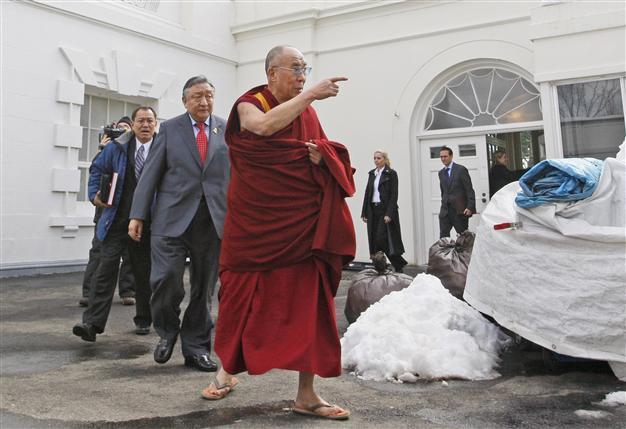Obama meets Dalai Lama, defies China
WASHINGTON - Agence France-Presse

In this Feb. 18, 2010, file photo, The Dalai Lama walks out of the White House in Washington, after meeting with President Barack Obama. AP photo
U.S. President Barack Obama welcomed Tibet's exiled spiritual leader the Dalai Lama to the White House Feb. 21, defying China, which said the meeting would "seriously impair" ties between the two countries.The encounter took place in the Map Room on the ground floor of the president's residence and not the Oval Office, which Obama usually uses to meet foreign leaders and visiting dignitaries.
There were no sightings of the Dalai Lama at the White House and, in a sign of its diplomatic sensitivity, the Obama administration ruled that the meeting would be closed to the press.
The National Security Council said on Twitter that Obama was meeting the Buddhist monk "in his capacity as an internationally respected religious & cultural leader."
Lobsang Sangay, the Tibetan prime minister-in-exile, hailed Obama for holding his third meeting as president with the Dalai Lama. The pair, both Nobel peace laureates, last met at the White House in 2011.
Sangay said that the two discussed the human rights situation inside Chinese-ruled Tibetan areas.
"It sends a very powerful message to Tibetans inside Tibet because it gives them a sense of hope that their voices are heard, even by the most powerful person in the world," Sangay told AFP after the meeting.
China, which calls the Dalai Lama a "wolf in sheep's clothing" and accuses him of seeking independence for Tibet, was quick to react to Thursday's announcement of a meeting.
"China is firmly opposed to this," foreign ministry spokeswoman Hua Chunying said in a statement.
"We urge the U.S. side to treat China's concern in a serious way and immediately cancel the planned meeting."
Hua called the Dalai Lama a "political exile who has long been engaged in anti-China separatist activities under the cloak of religion."
Sangay dismissed the Chinese charges, saying that the Dalai Lama has made clear he has no "anti-China" message and was peacefully seeking greater autonomy for Tibetans while accepting Beijing's rule.
'Tibet part of China'
On Feb.21, National Security Council spokeswoman Caitlin Hayden underlined that the United States supported the Dalai Lama's approach but recognized Tibet to be "a part of the People's Republic of China." "We do not support Tibetan independence," Hayden said.
"The United States strongly supports human rights and religious freedom in China. We are concerned about continuing tensions and the deteriorating human rights situation in Tibetan areas of China."
Hayden said the administration would renew calls for the Chinese government to resume dialogue with the Dalai Lama or his representatives, without preconditions.
China has for decades opposed foreign dignitaries meeting the revered Buddhist leader, who fled to India in 1959 after a failed uprising against Chinese rule.
In Beijing, Hua said that China had "already lodged solemn representations" with the United States.
"The U.S. leader's meeting with the Dalai is a gross interference in China's internal affairs, a severeviolation of codes of international relations and will seriously impair China-US relations," she said.
More than 120 Tibetans have set themselves on fire and committed suicide in recent years to protest against what they see as oppression by China's government and controls on their right to exercise their religion.
"The Dalai Lama is essentially a political fugitive whose group instigates separatist activities including self-immolations," the state-run Xinhua news agency said in a commentary.
The visit comes on the heels of a trip to Beijing by U.S. Secretary of State John Kerry, but well ahead of an Asia-Pacific summit there in November that Obama is expected to attend - meaning that China could not retaliate by canceling a high-profile visit.
Obama is due in Asia in April, but has no stop in China planned - though the visit will be dominated by questions over Beijing's tense relations with its neighbors.
Obama came under domestic criticism in 2009 when he did not see the Dalai Lama during a visit to Washington, as the new president looked to start on the right foot with China.
















